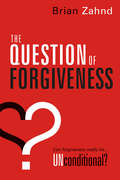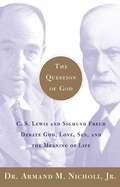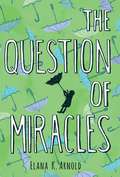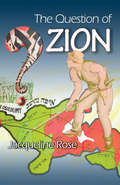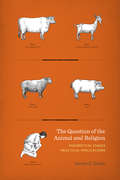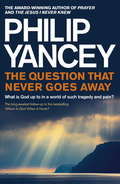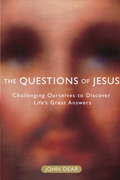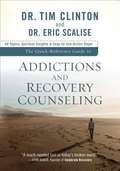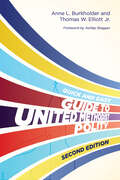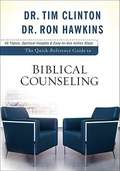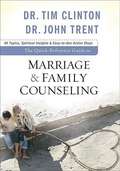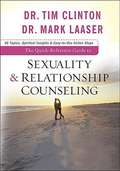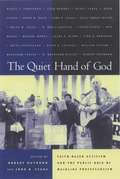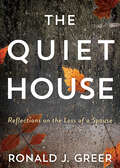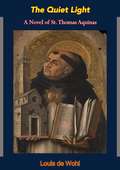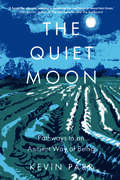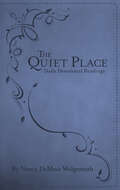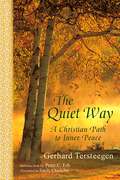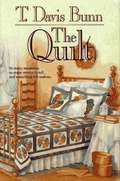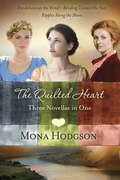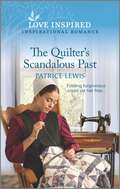- Table View
- List View
The Question of Forgiveness
by Brian ZahndIn this little book, we discover that if Christianity isn&’t about forgiveness, it&’s about nothing at all. But is there a limit to forgiveness? Is it always possible? Or even always right? This book begins with Simon Wiesenthal, an Austrian Jew imprisoned in a Nazi concentration camp during WWII, who was confronted with the plea for forgiveness from a dying Nazi SS soldier. This book will challenge you with the question: &“What would you do?&” The Question of Forgiveness reminds us that Christ&’s command to love your enemy is very hard to do, but as followers of Christ, we are called to believe that love is more powerful than hate—something that Christ modeled to the extreme of Calvary&’s cross. Zahnd digs into the question of forgiveness, and concludes with this: beyond the suffering of unconditional forgiveness lie the resurrection of love and the triumph of peace.
The Question of God: C.S. Lewis and Sigmund Freud Debate God, Love, Sex, and the Meaning of Life
by Armand Nicholi"This elegantly written and compelling comparison of the worldviews of Sigmund Freud and C. S. Lewis provides a riveting opportunity to consider the most important questions mankind has ever asked: Is there a God? Does he care about me? This profound book is for anyone who is earnestly seeking answers about truth, the meaning of life, and God's existence." -- Francis Collins, Director, National Human Genome Research Institute Many of history's greatest thinkers have wrestled with the ultimate question of belief and nonbelief in God. Though it might seem unlikely that any new arguments could possibly be raised on either side, the twentieth century managed to produce two men who each made brilliant, new, and lasting arguments, one in favor of belief and one opposed. Few spokesmen have ever championed their respective positions better than Sigmund Freud and C. S. Lewis. Sadly, as far as we know, they never met or debated each other directly. In The Question of God their arguments are placed side by side, as if they were standing at podiums in a shared room. Both thought carefully about the flaws and alternatives to their positions; each considered the other's views. Both men considered the problem of pain and suffering, the nature of love and sex, and the ultimate meaning of life and death. Here, with their debate made explicit, we can take ringside seats at one of history's most profound encounters. For more than twenty-five years Armand Nicholi has studied the philosophical writings of both men, and has taught a popular course at Harvard that compares the two worldviews. In The Question of God he presents the fruits of years of labor among the published and unpublished writings of Lewis and Freud, including an extensive exploration of their private letters. He allows them to speak for themselves on every major question of belief and nonbelief, but also skillfully draws conclusions from their own lives. Why did Freud have such difficulty maintaining lifelong friendships? How did Lewis's friendships change after his transition from atheism to belief? Why was Freud unable to willfully ignore his own internal moral sense, even though he believed it to be purely a product of socialization and not in any way eternally "true"? The Question of God may be the best book about belief and nonbelief ever written, since it does not presuppose which answer is correct. Instead, it uses two of history's most articulate spokesmen to present arguments on both sides. In the end, readers must join Nicholi's hundreds of former students in deciding for themselves which path to follow.
The Question of Miracles
by Elana K. ArnoldSixth-grader Iris Abernathy hates life in Corvallis, Oregon, where her family just moved. It's always raining, and everything is so wet. Besides, nothing has felt right since Iris's best friend, Sarah, died. When Iris meets Boris, an awkward mouth-breather with a know-it-all personality, she's not looking to make a new friend, but it beats eating lunch alone. Then she learns that Boris's very existence is a medical mystery, maybe even a miracle, and Iris starts to wonder why some people get miracles and others don't. And if one miracle is possible, can another one be too? Can she possibly communicate with Sarah again?
The Question of Zion
by Jacqueline RoseZionism was inspired as a movement--one driven by the search for a homeland for the stateless and persecuted Jewish people. Yet it trampled the rights of the Arabs in Palestine. Today it has become so controversial that it defies understanding and trumps reasoned public debate. So argues prominent British writer Jacqueline Rose, who uses her political and psychoanalytic skills in this book to take an unprecedented look at Zionism--one of the most powerful ideologies of modern times. Rose enters the inner world of the movement and asks a new set of questions. How did Zionism take shape as an identity? And why does it seem so immutable? Analyzing the messianic fervor of Zionism, she argues that it colors Israel's most profound self-image to this day. Rose also explores the message of dissidents, who, while believing themselves the true Zionists, warned at the outset against the dangers of statehood for the Jewish people. She suggests that these dissidents were prescient in their recognition of the legitimate claims of the Palestinian Arabs. In fact, she writes, their thinking holds the knowledge the Jewish state needs today in order to transform itself. In perhaps the most provocative part of her analysis, Rose proposes that the link between the Holocaust and the founding of the Jewish state, so often used to justify Israel's policies, needs to be rethought in terms of the shame felt by the first leaders of the nation toward their own European history. For anyone concerned with the conflict in Israel-Palestine, this timely book offers a unique understanding of Zionism as an unavoidable psychic and historical force.
The Question of the Animal and Religion
by Aaron S. GrossMakes a powerful case for elevating the category of the animal in the study of religion
The Question of the Animal and Religion: Theoretical Stakes, Practical Implications
by Aaron GrossThrough an absorbing investigation into recent, high-profile scandals involving one of the largest kosher slaughterhouses in the world, located unexpectedly in Postville, Iowa, Aaron S. Gross makes a powerful case for elevating the category of the animal in the study of religion. Major theorists have almost without exception approached religion as a phenomenon that radically marks humans off from other animals, but Gross rejects this paradigm, instead matching religion more closely with the life sciences to better theorize human nature.Gross begins with a detailed account of the scandals at Agriprocessors and their significance for the American and international Jewish community. He argues that without a proper theorization of "animals and religion," we cannot fully understand religiously and ethically motivated diets and how and why the events at Agriprocessors took place. Subsequent chapters recognize the significance of animals to the study of religion in the work of Ernst Cassirer, Emile Durkheim, Mircea Eliade, Jonathan Z. Smith, and Jacques Derrida and the value of indigenous peoples' understanding of animals to the study of religion in our daily lives. Gross concludes by extending the Agribusiness scandal to the activities at slaughterhouses of all kinds, calling attention to the religiosity informing the regulation of "secular" slaughterhouses and its implications for our relationship with and self-imagination through animals.
The Question that Never Goes Away: What is God up to in a world of such tragedy and pain?
by Philip YanceySome days, the news seems too much to bear. Yet another tsunami or earthquake or flood or fire or war atrocity. One more gun-toting madman stalking young people in idyllic Norway or moviegoers in Colorado or schoolchildren in Newtown, Connecticut. We turn off the news only to get a phone call about expectant parents with a stillborn baby, or a loved one whose cancer has returned. If we have faith in God, it gets shaken to the core. What was God doing in the moment when that tragedy could have been prevented? If we can't trust God to keep our children safe or our loved ones from dying in agony, what can we trust God for?In his classic book WHERE IS GOD WHEN IT HURTS?, Philip Yancey gave us permission to doubt, reasons not to abandon faith, and practical ways to reach out to hurting people. Now, with new perspectives and stories gathered across nearly twenty-five years, once again he tackles the hard questions head-on. His visits to three places in 2012 raised the old problems with new urgency. More veteran pilgrim than curious journalist in his later years, Yancey faces with his trademark honesty the issues that often undermine faith, yet he emerges with comfort and hope. Along the way, he shows that Christians have an important role to play in bringing healing to a deeply wounded world.There are hopeful reasons to ask, once again, the question that never goes away...
The Questions of Jesus
by John DearThis illuminating examination of the Gospels reveals how the questions Jesus asks of his followers lead the way to a deeper understanding of the meaning of life and the mystery of God. The Gospels are filled with stories, parables, miracles, commandments, and dramatic incidents that trace Jesus' life and recount his teachings. A close reading of the Gospels reveals, however, that they are also filled with questions. As John Dear points out in this remarkable book, Jesus, like any great teacher and rabbi, "has a question for everyone he meets, for every occasion, for every experience, for every potential disciple." Dear uses these questions as a starting point, an invitation to readers to discover the lessons they contain by searching their own hearts and minds for answers. Throughout The Questions of Jesus, Dear interweaves insights from ethical and religious teachers ranging from Buddha to Gandhi to Martin Luther King, Jr. Using recent events as powerful and poignant examples, he shows why a renewed commitment to Jesus' message of nonviolence, compassion, justice, and peace is essential to healing a world torn by violence and war.From the Trade Paperback edition.
The Quick Reference Guide to Addictions And Recovery Counseling: 40 Topics, Spiritual Insights, And Easy-to-use Action Steps
by Tim Clinton Eric ScaliseThe newest addition to the popular Quick-Reference Guide collection, "The Quick-Reference Guide to Addictions and Recovery Counseling" focuses on the widespread problem of addictions of all kinds. It is an A-Z guide for assisting pastors, professional counselors, and everyday believers to easily access a full array of information to aid them in formal and informal counseling situations. Each of the forty topics covered follows a helpful eight-part outline and identifies (1) typical symptoms and patterns, (2) definitions and key thoughts, (3) questions to ask, (4) directions for the conversation, (5) action steps, (6) biblical insights, (7) prayer starters, and (8) recommended resources.
The Quick and Easy Guide to United Methodist Polity Second Edition
by Thomas W. Jr. Anne L. BurkholderPolity and purpose for ordering our lives for God’s mission.Transform your understanding of United Methodist Church governance with this newly updated guide, reflecting the pivotal changes from the 2020/2024 General Conference. Whether you're a seasoned pastor or new to church leadership, this comprehensive resource illuminates the path forward in our shared mission to transform the world for Christ.This invaluable companion features:* Over 250 alphabetized entries, thoughtfully curated from "Accessibility" to "Youth Ministry"* Inspiring quotes from John Wesley and Methodist luminaries that connect our past to our present* Clear, practical explanations that bridge theological foundations with everyday church leadership* Precise cross-references to the Book of Discipline, ensuring confident decision-making* Essential tools including a quick-start guide and comprehensive acronym indexPerfect for everyone from local pastors to bishops, this guide transforms complex church polity into clear, actionable insights. It''s more than a reference—it's your partner in ministry, helping you lead with wisdom, understanding, and purpose in our evolving denominational landscape.
The Quick-Reference Guide to Biblical Counseling: Personal and Emotional Issues
by Tim Clinton Ron HawkinsBut sometimes those who are faced with helping the hurting could use a little more information about the problems people bring to them. The Quick-Reference Guide to Biblical Counseling provides the answers. This A-Z guide gives pastors, counselors, and everyday believers the information they need to help congregants, clients, and friends in a wide array of situations. The many issues addressed include Addictions Burnout Forgiveness Sexual abuse in childhood Worry Each of the forty topics covered follows a helpful eight-part outline and identifies typical symptoms and patterns, definitions and key thoughts, questions to ask, directions for the conversation, action steps, biblical insights, prayer starters, and recommended resources. Book jacket.
The Quick-Reference Guide to Marriage and Family Counseling
by Tim Clinton John Trent Ron HawkinsWe all know of families or marriages in crisis. When those suffering in such situations turn to us for help, where do we turn? The Quick-Reference Guide to Marriage and Family Counseling provides the answers. It is an A.Z. guide for assisting people helpers pastors, professional counselors, youth workers, and everyday believers to easily access a full array of information to aid them in (formal and informal) counseling situations. Issues addressed by Clinton and Trent include affairs and adultery, communication in marriage, parenting, sibling rivalry, and many more. Each of the forty topics covered follows a helpful eight part outline and identifies: 1) typical symptoms and patterns, 2) definitions and key thoughts, 3) questions to ask, 4) directions for the conversation, 5) action steps, 6) biblical insights, 7) prayer starters, and 8) recommended resources. About the series The Quick-Reference Guides are AZ guides that assist people helpers pastors, professional counselors, youth workers, and everyday believers to easily access a full array of information to aid them in (formal and informal) counseling situations. Each of the forty topics covered follows a helpful eight part outline and identifies: 1) typical symptoms and patterns, 2) definitions and key thoughts, 3) questions to ask, 4) directions for the conversation, 5) action steps, 6) biblical insights, 7) prayer starters, and 8) recommended resources.
The Quick-Reference Guide to Sexuality and Relationship Counseling
by Tim Clinton Mark LaaserOne of the foremost counseling needs in our day is help with sexuality and relationship issues. But sometimes those who are faced with helping the hurting could use a little more information about the problems that people bring to them. "The Quick-Reference Guide to Sexuality and Relationship Counseling" provides the answers. It is an A-Z guide for assisting people-helpers--pastors, professional counselors, youth workers, and everyday believers--to easily access a full array of information to aid them in (formal and informal) counseling situations. Each of the 40 topics covered follows a helpful eight-part outline and identifies: 1) typical symptoms and patterns, 2) definitions and key thoughts, 3) questions to ask, 4) directions for the conversation, 5) action steps, 6) biblical insights, 7) prayer starters, and 8) recommended resources. About the seriesThe Quick-Reference Guides are A-Z guides that assist people-helpers--pastors, professional counselors, youth workers, and everyday believers--to easily access a full array of information to aid them in (formal and informal) counseling situations. Each of the forty topics covered follows a helpful eight-part outline and identifies: 1) typical symptoms and patterns, 2) definitions and key thoughts, 3) questions to ask, 4) directions for the conversation, 5) action steps, 6) biblical insights, 7) prayer starters, and 8) recommended resources.
The Quiet Flame: Mother Marianne of Molokai
by Eva K. BetzMarianne of Molokai, the lady who did not shun lepers, comes alive in this vividly written fiction for young people.
The Quiet Hand of God: Faith Based Activism and the Public Role of Mainline Protestantism
by Robert Wuthnow John Hyde EvansWith George Bush's election, there has been a push to redirect government welfare programs through churches, which would then be responsible for administering social services to the public. This volume assesses the ability of Protestant organizations to shoulder the responsibility. Does the church have the ability to adequately meet the needs of the public?
The Quiet House: Reflections on the Loss of a Spouse
by Ronald J. GreerFind comfort in a message of hope and healing.The loss of a spouse is a devastating experience, but pastoral counselor Ron Greer invites readers into his own grief journey with messages of hope and healing. The Quiet House calls on the image of a home silenced by absence but also speaks about the possibility of moving forward together through the heartache of loss toward hope. Through an elegant series of personal reflections, Greer, a pastoral counselor, offers steps and reflections of healing while tending to marriage memories. Pastors may find this book a profound help and comfort for grieving members.
The Quiet Light
by Louis De WohlThe Quiet Light is one in a series of books by Louis de Wohl dealing with loves of various saints. This book covers the life and times of St Thomas Aquinas, a Dominican monk and philosopher. Thomas Aquinas is well known as scholastic philosopher and is the author of the Summa Theologica. Easy read and quite interesting.
The Quiet Light: A Novel of St. Thomas Aquinas
by Louis WohlThe famous novelist Louis de Wohl presents a stimulating historical novel about the great St. Thomas Aquinas, set against the violent background of the Italy of the Crusades. He tells the intriguing story of St. Thomas who—by taking a vow of poverty and joining the Dominicans—defied his illustrious, prominent family’s ambition for him to have great power in the Church.The battles and Crusades of the 13th century and the ruthlessness of the excommunicated Emperor Frederick II play a big part in the story, but it is Thomas of Aquino who dominates this book. De Wohl succeeds notably in portraying the exceptional quality of this man, a fusion of mighty intellect and childlike simplicity. A pupil of St. Albert the Great, the humble Thomas—through an intense life of study, writing, prayer, preaching and contemplation—ironically rose to become the influential figure of his age, and he later was proclaimed by the Church as the Angelic Doctor.As in all of his novels about great saints of the church, Louis de Wohl weaves an intricate colorful tapestry of love, violence and piety to bring to life a tremendous historical figure and the fascinating period in which he lived.Louis de Wohl was a distinguished and internationally respected Catholic writer whose books on saints have been best-sellers worldwide. Other available titles include Lay Siege to Heaven, Set All Afire and Citadel of God. Sixteen of his books were made into films.
The Quiet Moon: Pathways to an Ancient Way of Being
by Kevin ParrThe ancient Celts lived by and worshipped the moon. While modern, digital life is often at odds with nature – rubbing against it rather than working in harmony with it – is there something to be said for embracing this ancient way of being and reconnecting to the moon’s natural calendar?*January’s Quiet Moon reflects an air of melancholy, illuminating a midwinter of quiet menace; it was the time of the Dark Days for the ancient Celts, when the natural world balanced on a knife edge. By May, the Bright Moon brings happiness as time slows, mayflies cloud and elderflowers cascade. Nature approaches her peak during a summer of short nights and bright days – this was when the ancient Celts claimed their wives and celebrated Lugnasad. With the descent into winter comes the sadness of December’s Cold Moon. Trees stand bare and creatures shiver their way to shelter as the Dark Days creep in once more and the cycle restarts.In The Quiet Moon, Kevin Parr discovers that a year of moons has much to teach us about how to live in the world that surrounds us – and how being more in tune to the rhythms of nature, even in the cold and dark, can help ease the suffering mind.
The Quiet Place: Daily Devotional Readings
by Nancy Leigh DeMossBestselling author Nancy Leigh DeMoss adapts the core themes of her teaching into a format her fans can enjoy daily: 366 portions of rich Bible study and practical applications.
The Quiet Place: Daily Devotional Readings
by Nancy Leigh DeMossBestselling author Nancy Leigh DeMoss adapts the core themes of her teaching into a format her fans can enjoy daily: 366 portions of rich Bible study and practical applications.
The Quiet Way: A Christian Path to Inner Peace
by Gerhard TersteegenThe profound spiritual counsel of the 18th century German Protestant lay theologian, pastor, and mystic Gerhard Tersteegen is presented in this volume in the form of short selections from 100 of his letters.
The Quilt
by T. Davis BunnThis is the story of Mary, an elderly grandmother whose gnarled, arthritic hands have a beauty all their own. They represent so many skills, so many memories, so many stories to be told. Anyone who had met Mary described her as beautiful--she had always been there to listen and comfort and encourage those who were in pain, those who had lost their way. And yet in the twilight of her days, Mary felt a gentle yearning in her heart, the whisper of a melody she strained to hear....There was something left undone. When Mary becomes convinced that the task still unfinished is to make one more very special quilt, with every stitch sewn in prayer and thankfulness, the impact on her family and the surrounding community cannot be contained. No one who gets involved with this quilting project will ever be quite the same again!
The Quilted Heart Omnibus
by Mona HodgsonLike a beautiful patchwork quilt, the three novellas in The Quilted Heart tell stories of lives stitched together with love and God's unending grace. Once a week, Elsa Brantenberg hosts the Saint Charles Quilting Circle at her farmhouse on the outskirts of the riverside town of St. Charles, Missouri. The ladies who gather there have all experienced heartache related to the intense hardships of the Civil War, and together, they are facing their painful circumstances with friendship and prayer. Can the tattered pieces of their hearts be stitched together by God's grace? Dandelions on the Wind When Maren Jensen took a job on Elsa Brantenberg's St. Charles, Missouri farm, she never expected to call the place her home. As she grows to love Mrs. Brantenberg and her granddaughter, Gabi, Maren is transformed from a lonely mail-order bride-without-a-groom to a beloved member of the Brantenberg household. But when Gabi's father, Rutherford "Wooly" Wainwright, returns to the farm unexpectedly, everything changes for Maren, and she feels compelled to find another job. Are her choices in obedience to God, or is she running from His plan? Bending Toward the Sun Dedicated to her education and to helping her father in his general store, Emilie Heinrich is convinced she doesn't have time for love. But when a childhood friend returns to St. Charles, Missouri, after serving in the Civil War, his smile and charm captures Emilie's eye and her heart. Will she be forced to choose between honoring her father and a future with a husband and family of her own? Ripples Along the Shore Change is brewing in St. Charles. A group of brave souls are preparing to head west on the Boone's Lick Wagon Train, led by the mysterious and handsome Garrett Cowlishaw, who served as a Confederate soldier in the war that killed Caroline's husband. Despite her dislike for him, Caroline is tempted to join the wagon train and start fresh somewhere new, but when Mr. Cowlishaw forbids her--a single woman--to travel with them, will one man's prejudice destroy Caroline's hope for a new future? Or will the ripples of God's love bring the answer she needs?
The Quilter's Scandalous Past: An Uplifting Inspirational Romance
by Patrice LewisTo make a deal… She must bury the past With her uncle&’s health declining, Esther Yoder wants nothing more than to sell his mercantile store. But what she doesn&’t count on is Joseph Kemp being the prospective buyer. He&’s the reason Esther fled her Amish community, and Esther fears her shameful past could threaten the sale. Can they learn to forgive each other…or will old guilt stand in the way of their future? From Love Inspired: Uplifting stories of faith, forgiveness and hope.
